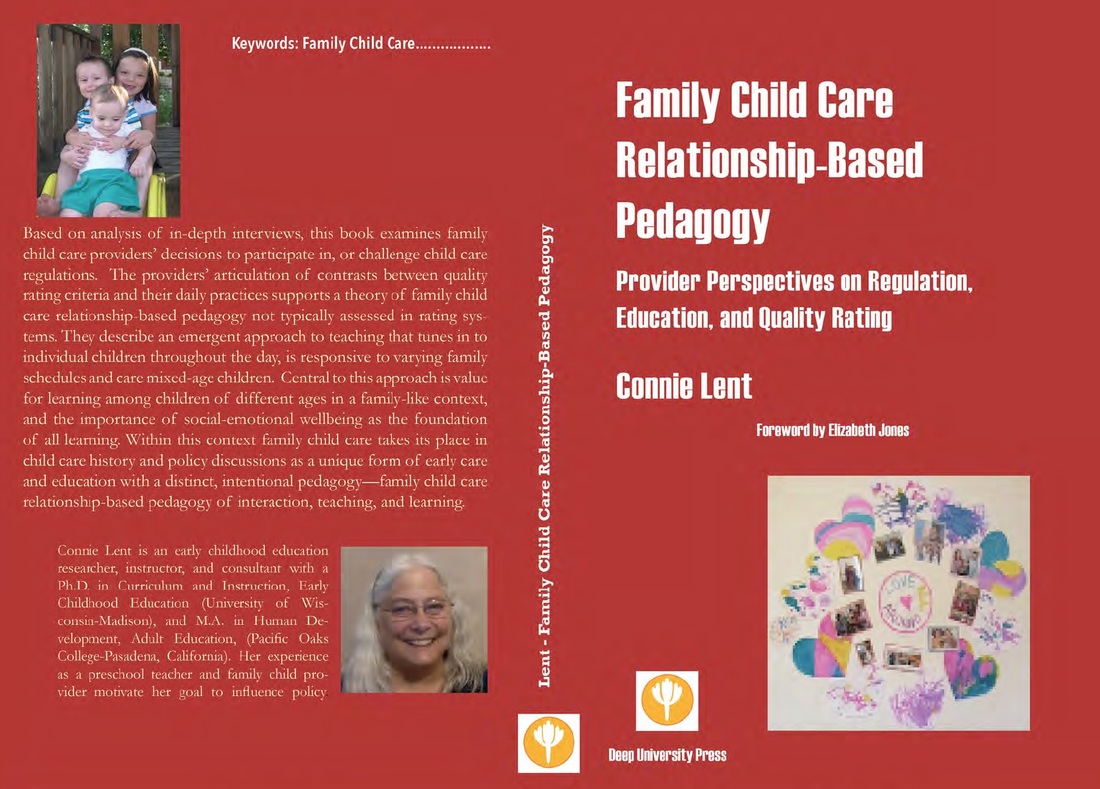The in-depth interviews for this work were collected over one and one-half years. I am grateful for the trust that was placed in me to share the experiences of the interview participants. Every effort was made to represent the intentions of each participant as accurately as possible and all family child care providers who participated in the study were included in the analysis. However, the analysis and interpretation of the data is solely the responsibility of the researcher and any errors or omissions are my own.
|
What do family child care providers say about their experiences with regulation processes of licensing, training and education, and quality rating? This text provides an extensive history of family child care and examines how providers' experiences impact their decision to participate in, or challenge child care regulations. Family child care providers are at a turning point in their profession as they integrate practices from experiential learning, mentoring in support groups, and formal early childhood education. Increased standardized regulations have pushed many providers to reflect deeper and articulate more clearly their preferred approach to teaching and learning. Interpretive phenomenology and constructivist grounded theory were used to analyze twenty-six in-depth interviews of family child care providers from urban and rural communities in Wisconsin. Information from academic literature and related public media situate the analysis in social, cultural, and historical context of early childhood education policy in the United States.
|
The providers’ articulation of the contrast between quality rating criteria and their daily practices support a theory of family child care relationship-based pedagogy that is not typically assessed in current quality rating and improvement systems. They described a highly emergent approach to teaching and learning that incorporates multiple activity options, tunes in with individual children throughout the day, and is responsive to varying family schedules and the individual needs for care associated with children of different ages. Central to this approach is value placed on learning that occurs among children of differing ages in a family-like context, and the importance of social emotional wellbeing as the foundation for positive outcomes for all other learning. Within this context family child care takes its place firmly in child care history and policy discussions as a unique form of early care and education with a distinct and intentional pedagogy—family child care relationship-based pedagogy of interaction, teaching, and learning.
Connie Lent has provided a much needed examination of the effect new quality rating scales (QRIS) have had on family day care provision in Wisconsin where a carrot and stick approach to the notion of what is "quality" gives funds to those centers (small family child care and bigger group centers) based largely on whether they already have resources for accreditation. For family child care providers, who provide much of the child care for young children in the USA, the Wisconsin policies have been a disaster, as Lent's study documents beautifully. Her qualitative study and Interviews with providers illustrate the stresses and reasons why many family child care providers have opted out of the quality rating system, with many closing their doors. A must read for those interested in policy related to "quality rating instruments" and their effects on an already fragile system of child care in America.
Marianne (Mimi) Bloch, Professor Emerita in Early Childhood, Department of Curriculum and Instruction, Department of Gender and Women's Studies, University of Wisconsin-Madison |




